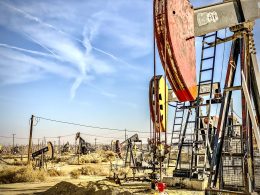Environmental campaigners have lodged a complaint against WPP, a leading London-based advertising firm, with the Organisation for Economic Co-operation and Development (OECD). They allege the company has violated international guidelines on corporate responsibility, climate, and human rights.
The complaint, filed by Adfree Cities and the New Weather Institute with the OECD’s UK branch, criticises WPP for working with major fossil fuel corporations such as BP, Saudi Aramco, and Shell, along with other high-emission industries including automotive manufacturers, airlines, and plastics firms. Research by DeSmog suggests that WPP, the world’s largest advertising agency by revenue, also collaborates with TotalEnergies and multiple oil and gas companies.
“This complaint escalates the legal risks for advertising firms,” said Harj Narulla, a barrister supporting the campaigners. “By continuing these partnerships, WPP contradicts its environmental commitments and contributes to widespread harm.”
The OECD’s UK National Contact Point, based where WPP is headquartered, is reviewing the complaint. Campaigners claim this is the first instance of an advertising agency facing such scrutiny under OECD guidelines.
“WPP promotes some of the most polluting corporations globally while publicly claiming to support climate action,” stated Andrew Simms, co-director of the New Weather Institute. “This complaint seeks to hold WPP accountable to international commitments and its own environmental claims.”
Activists are calling for WPP to disclose emissions linked to its advertising activities, conduct due diligence to mitigate environmental and human rights harms, and sever ties with clients that fail to align with global climate goals.
“This would simply bring WPP in line with its own declared principles,” added Simms.
As of 2023, WPP had more fossil fuel industry contracts—at least 55—than any of its major competitors. The company has not issued a response to the complaint.
In June 2024, UN Secretary-General António Guterres urged governments to ban fossil fuel advertising and called on marketing firms to “stop enabling environmental destruction. Refuse new fossil fuel contracts immediately and commit to ending existing ones.”
WPP CEO Mark Read has previously defended the firm’s work with oil and gas companies, asserting in 2022 that the agency was helping them transition to cleaner energy models. WPP’s 2023 annual report states that its mission is to “harness creativity to build better futures for people, the planet, clients, and communities.” The report also claims that working on projects undermining the Paris Agreement’s climate objectives would violate its internal policies.
UK advertising regulators have banned several WPP-produced adverts for misleading green claims. In 2023, the Advertising Standards Authority (ASA) prohibited a Shell campaign, created by WPP-owned Wunderman Thompson (now VML), which implied a significant focus on renewable energy despite fossil fuels comprising the bulk of its business. In 2022, the ASA banned an HSBC advert by WPP subsidiary Ogilvy for overstating the bank’s climate efforts while omitting its major fossil fuel investments.
WPP agencies also collaborate with major plastic polluters, including Coca-Cola, Danone, and Nestlé, which collectively account for 17 per cent of branded plastic pollution globally. Experts warn plastic waste is fuelling a global environmental and health crisis.
An OECD complaint undergoes a five-stage review process, starting with an initial assessment to determine its viability. If accepted, the OECD may facilitate mediation between the parties to seek a resolution.
In 2019, BP withdrew an advertising campaign following an OECD complaint by environmental legal group ClientEarth, which accused the company of misleading the public by exaggerating its investment in low-carbon energy while downplaying its fossil fuel operations.
Though OECD guidelines are not legally binding, they carry weight among member countries, and a ruling against WPP could damage its reputation.
Paris-based advertising firm Havas recently acknowledged reputational risks linked to fossil fuel clients in its stock market prospectus. The company faced backlash in September 2023 when it won a major Shell contract, resulting in four of its agencies losing their B Corp ethical certification.
The OECD’s decision on WPP’s case could set a significant precedent for the advertising industry’s role in promoting fossil fuels.





















